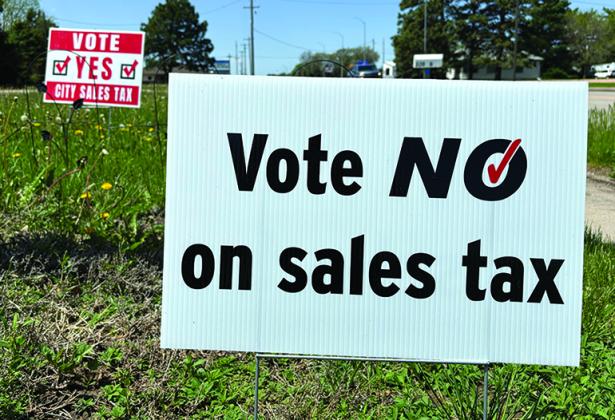‘Yes We Can’ Committee hosts town hall expressing concern with vague resolution
With a May 14 vote to decide if citizens should support a 1-1/2 percent sales tax just days away a group of concerned citizens hosted a second town hall meeting Friday to explain why they believe Aurora can continue to grow without it.
The “Yes We Can” committee, represented by Jim Ediger, Jannelle Seim and Wade Regier, shared much of the same information and rationale from a similar forum in April, adding that the city has not proven or explained the need for implementing a sales tax and increasing its restricted funds budget by $1 million as proposed by Resolution 24-05.
“We’ve been here before,” Regier told a group of 20 people gathered for a noon meeting at the Bremer Center. “I would never bet against Aurora. Our growth, the energy we have in this community, and the prospects that we have in this community tells me that we will continue to be able to do it the way we do it, and that is without a sales tax.
“We can continue to grow and continue to meet our obligations,” Regier continued. “We offer the finest public service, public safety services in this community. I would put our public services up against anyone, anywhere, and we an continue to fund those with our growth.”
Seim, who volunteers her time as president of the Aurora Housing Development Corporation, said Aurora is now in the midst of an economic boom, with several new businesses and housing subdivisions already under construction.
“I will say that in the next 24 months $50 million will be added to the tax base, which will come back in tax revenues to the city, as well as through utilities, which is something that people don’t consider,” she said. “It is estimated that will add $200,000 in tax revenues to the city and that doesn’t include utility revenues.”
“That’s a 10 percent increase in what we’re currently assessed,” Ediger later added. “So when you look at that, even if we keep the mill levy the same for property taxes, that’s over $200,000 per year that we’re going to have in additional property taxes just because of our growth. We think those are smart (infrastructure) investments by the city. They’ve been a good partner in working on these projects, but that is where the growth matters and how it helps us continue to keep our mill levy low. We don’t need a sales tax because we are growing and we’re broadening that property tax base.”
Potential downside
Addressing a question about the potential downside of adding a local sales tax, Seim said from her perspective it could hinder future growth by raising development costs and discouraging people from wanting to invest in Aurora.
“My full-time volunteer gig is trying to make sure that we have enough workforce housing in this community and adding a 1-1/2 percent sales tax on to an already incredibly difficult job of building affordable homes, it just doesn’t make sense to me,” she said, noting that the cost of building an affordable home in Nebraska, by definition, is now $325,000. “Adding 1-1/2 percent to that really is going to impact what developers and what our builders can do.
“Not only that, but I feel like we’ve kind of done a little switcheroo on some of the people that have devoted their time and resources to building out Aurora, whether it’s with enterprises or housing,” she added. “We have tons of opportunities or projects going on right now and to implement this halfway through those getting through that throws up budgets and that throws off what they are doing. It’s just not a good business practice.”
Ediger explained how a 1-1/2 percent sales tax could impact the cost of building a home in Aurora.
“We recommend or encourage builders to use Sack Lumber here in town, but if they’re getting $100,000 in materials delivered to Aurora from Grand Island or a neighboring community, that 1-1/2 percent savings on those materials is passing through to the eventual homeowner or home buyer,” he said. “That is a big deal when we talk to our builders.”
Regier said he believes an extra 1-1/2 percent sales tax could be the difference between a house or project being built, or not.
“That’s a real number on a $325,000 house,” he said. “That might be the make or break for somebody to want to take the risk to go build a house to help out our community. That’s why this is significant. One and a half percent, a hear it a lot, may seem insignificant, but that’s not true. If you put it on paper and you look at it on your budget, everybody has their monthly budgets and most people on a fixed income are setting their budgets within the dollar, that 1-1/2 percent will create an impact to a lot of fixed incomes and create an impact so that some people will have to figure out how to give something up.”
Tax shift?
Ediger began the presentation by explaining why he believes implementing a 1-1/2 percent sales tax will have a negative impact on residents and businesses in the community.
“The sales tax you are going to be asked to vote on May 14 is a tax increase, not a tax shift from property tax to sales tax,” Ediger said. “We’re hearing a lot at the state level on the governor’s plan to have a tax shift, or a proposed plan to have a tax shift from property tax to sales tax, but that’s not what this resolution does. It is a new tax that’s expected to generate at least $1.3 million in new revenue for the city.”
Mayor Marlin Seeman, who attended Friday’s forum but did not speak, addressed in an ANR article published April 3 why the city put the sales tax question on the ballot. He explained, in broad terms, that sales tax revenue would be used to fund a reduction in property tax, enhance economic development and support recreation activities, public safety, civic and social activities, while also maintaining the level of municipal services desired by local citizens.
Ediger said the city’s explanation lacks specific details necessary for voters to support it.
“Those items represent essentially the full function of local government,” he said. “Importantly, there is not a firm commitment to use any of the revenues for property tax relief. If the resolution stated that this would result in a dollar for dollar offset to property taxes, I think our discussion in the community would be a lot different today. We probably wouldn’t be having this town hall meeting because I do think there is support for a true dollar for dollar shift, but that’s not what this resolution does.”
Seim said she shared two main concerns with the Aurora City Council just before it voted unanimously to put this issue on the ballot at its Feb. 13 meeting, both of which now are reason enough to vote it down.
“There is no specific purpose, in my opinion, or no end date written in this resolution,” she said. “The language of the resolution provides a broad list of the five areas … but there’s no allocation tied to that, those are just categories in which that money can be spent, which is a real concern in my mind. The other concern is that there is no end date and so this could potentially go on forever. As we know, it’s harder to get an item on the ballot at our level than it is at the state level, so if we’re not happy with it it is really hard to reverse that decision.”
Regier expanded on that point, noting that the second part of Resolution 24-05 would allow the city to increase its budgeted restricted funds by $1 million, which represents a 23.5 percent increase.
“That’s a pretty big jump,” he said. “So this is not a $1 million decision, you know, it’s a $10 million or $15 million decision over 10 years is what we’re looking at because that doesn’t go away. That’s not an annual reset, where we need money one time to go put in a street or we need money one time, that is a permanent increase that the people are voting on so the impact is significantly bigger than just a million dollars. It’s a big decision. It’s a lot of trust that we’re placing in government by allowing them a significant increase in their revenue authority.”
Why is Aurora different?
Kyle Peterson, a government teacher at AHS, served as moderator for the forum, asking questions the committee has researched based on community feedback. One of those questions is “Why does Aurora not have a sales tax when other Nebraska communities do?”
“Aurora is unique in its philosophy that we don’t need to use sales tax dollars in order to grow or maintain that growth,” Seim responded. “We have experience strong business and household growth over and over and over and we are consistent in that.”
Ediger noted that Aurora also has a strong reputation as a benevolent community, which is evident in the number of facilities like the library, Bremer Center, Edgerton Center, ball fields and others that are built without using taxpayer dollars.
“What really sets us apart from a lot of communities, especially the ones our size, are the level of private giving, volunteerism, foundations, trusts, and nonprofit organizations that fund and continue to operate these facilities,” he said. “The housing push and economic development, those are volunteers taking time out of their jobs to help our community grow, and then in return we think all the taxpayers are benefiting from those efforts not being led at the city level.”
Another factor, Seim said, is that Aurora is not a destination shopping hub as compared to communities like Grand Island, Kearney and York. The Nebraska Public Power District listed Aurora’s pull factor, which measures a community’s non-motor vehicle sales on a per capita basis, at .87, compared to 1.93 in York and 1.57 in Grand Island.
“We are not a major retail trade area,” she said. “A vast majority of this sales tax will be a tax on you and me as people who live here on our utilities and our online purchases. And have you considered how much you spend on Amazon? I tried to look it up and I almost didn’t want to. It’s a lot when you consider how much more you shop online today than you did five years ago pre-COVID.”
Seim said the committee did some preliminary math and computed that the average Aurora household would pay between $555 and $650 per household in additional sales taxes.
“We keep talking about this because 85 to 90 percent of the sales tax will be paid by you and me as residents of this community,” she said. “There is an argument that we do have visitors in this community and we have people who stop in at the interstate and make purchases at Love’s. We talked to them and only about 10 percent of the items that are purchased there … would you be paying sales tax. It’s not as significant as you would think. I’m not saying that it’s an insignificant sum, but it’s not $1.3 million. It’s like $100,000.”
Another concern repeated from the April forum was the issue of what Ediger said is the regressive nature of a sales tax.
“A sales tax, by nature, taxes every individual the same, regardless of income level, so at that level it’s a different treatment between high income earners and low-income earners,” he said. “A progressive tax would be a property tax, where if you have a large net worth or income, presumably your assets, your house, are worth more so even if that tax level is the same you have a larger assessed value and are paying more.
“One reason the governor had so much trouble with LB 388 is that a group of folks said this is a tax shift from property tax, which is more progressive, to a sales tax, which is regressive in nature,” he added. “It just wasn’t acceptable for our state. You had three groups of people opposing that bill in Lincoln and that was a big reason it failed, is the regressive nature of a sales tax.”
After less than an hour of presentations and a brief question and answer period, the session ended on a positive note.
“The government teacher in me wants to encourage everybody to be an educated voter and that’s exactly what you guys are doing today,” Peterson said. “You’re becoming more educated on the topic. Thank you for your interest and thank you for coming.”
Ediger said he too appreciated the interest, adding that he believes face-to-face interaction is a healthy way to address what has proven to be a divisive issue in the community.
“I know the last time we had a sales tax on the ballot (2012) it was a divisive issue and I think it’s starting to be a little bit divisive in our community,” he concluded. “You know, this is going to end on May 14 and we’re going to know whether the sales tax is going to be approved by the voters or not, but we need to be able to have these conversations in our community and not have it be a divisive issue, because I think it is healthy for us to have these conversations in these town halls.”





